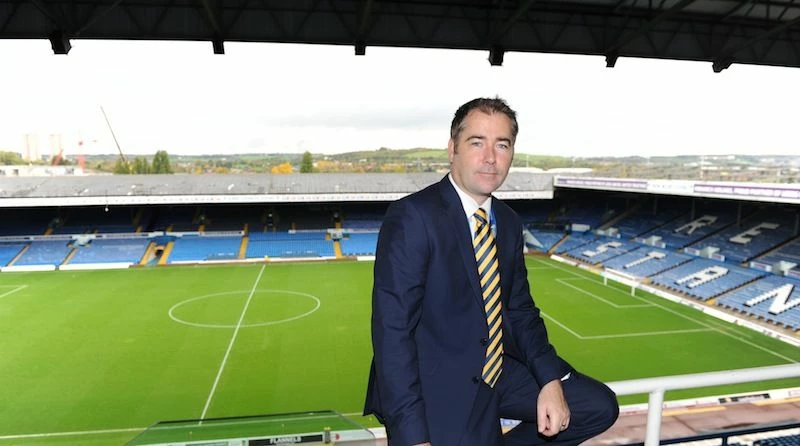
Partner Article
Behind the business at Leeds United Football Club
Running a football club is quite unlike any other business - off-the-pitch commercial fortunes can be influenced by on-the-pitch events. Advertising, corporate sponsorship and profile of the club are all heavily interdependent.
Paul Bell is Leeds United’s director of commercial affairs, and looks after some of the club’s main revenue streams, including advertising, hospitality and sponsorship. Retail and ticketing make up the club’s other two broad areas of income.
“We’re always looking for new sponsors and new commercial partners. We have a portfolio of current sponsors who I believe are the envy of many clubs, not just in the Championship, but also in the Premier League,” explains Paul.
Major international sponsors such as Heineken and Sky Bet sit alongside local outfits such Leeds-headquartered defence manufacturers Hesco Bastion and another Leeds business, Flannels, the clothing retailer who provide the official matchday suits.
Paul suggests the partnerships, even as recently as four years ago, were very “Leeds-centric.” This has now changed with a portfolio of more high-profile national brands.
He adds: “Our fanbase stretches countrywide. Of course there’s a concentration in West Yorkshire, but it’s unlike other clubs whose fanbase sits within a 10-15 mile radius. The term ‘big club’ is one that’s often loosely used, but Leeds United is genuinely a big club - for instance we’ll sell 100,000 replica kits in the Championship.”
Look at the Heineken sponsorship. The deal provides the Club with top market brands such as Fosters and John Smiths for matchday guests and also provides the stadium with new bar equipment to process drinks at a faster pace.
“We always look at sponsorship deals in a rounded way. One element is the fee and financial contribution that a sponsor brings to the club, but the other is our brand mix,” Paul adds.
The club invested in a multi-million pound revamp of the its hospitality facilities a few years ago and now caters for on average around 1,000 hospitality guests on a matchday.
Of the 48 boxes in the East Stand of the stadium, the club have sold the majority on a seasonal basis and all four stands are sponsored - the first time this has happened in recent history.
Paul adds: “When we return to the Premier League we’d expect to see greater demand from the financial and legal communities within Leeds.
“When we’ve played biggames recently against the likes of Manchester United, Chelsea and Arsenal we have seen significantinterest from these sectors.”
Competition with other clubs is fierce, although the Leeds United benefit from being a “one-club city.”
“Close by we’ve got Huddersfield and Hull, but there’s very little cross-over in terms of the fanbase. As I mentioned, our fans are geographically diverse and we often get people travelling in from the likes of Aberdeen, the Isle of Man or even Gibraltar for games,” Paul continues.
Brands seeking sponsorship want a club that will give them a big audience and return on their investment. Leeds United is bigger than many of its Premier League contemporaries, and is well placed to promote its wide following to sponsors, at “non Premier League prices.”
Paul explains: “Our share of the TV exposure and size of fanbase offers sponsors fantastic reach, but at an affordable price. There’s also more tactical reasons for sponsors to go with Leeds.
“For instance we have Monarch Airlines branding on the North Stand, which overlooks the M621, one of the main arterial routes into Leeds city centre - visible to millions of vehicles every year.
“The brand awareness from this will help to leverage sales of Monarch’s routes from Leeds Bradford Airport. Equally some brands will get involved with us for fan engagement purposes because they see sponsorship as more versatile than straight-up advertising.”
This was posted in Bdaily's Members' News section by Tom Keighley .
Enjoy the read? Get Bdaily delivered.
Sign up to receive our popular Yorkshire & The Humber morning email for free.








 Raising the bar to boost North East growth
Raising the bar to boost North East growth
 Navigating the messy middle of business growth
Navigating the messy middle of business growth
 We must make it easier to hire young people
We must make it easier to hire young people
 Why community-based care is key to NHS' future
Why community-based care is key to NHS' future
 Culture, confidence and creativity in the North East
Culture, confidence and creativity in the North East
 Putting in the groundwork to boost skills
Putting in the groundwork to boost skills
 £100,000 milestone drives forward STEM work
£100,000 milestone drives forward STEM work
 Restoring confidence for the economic road ahead
Restoring confidence for the economic road ahead
 Ready to scale? Buy-and-build offers opportunity
Ready to scale? Buy-and-build offers opportunity
 When will our regional economy grow?
When will our regional economy grow?
 Creating a thriving North East construction sector
Creating a thriving North East construction sector
 Why investors are still backing the North East
Why investors are still backing the North East